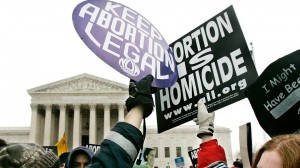The Roe Enigma: What the Pew Survey Tells Us
 On January 16, in preparation for the 40th anniversary of Roe v. Wade and Doe v. Bolton, the Pew Research Foundation issued the results of a 1,502 person survey dealing with abortion and the attitudes of those surveyed.
On January 16, in preparation for the 40th anniversary of Roe v. Wade and Doe v. Bolton, the Pew Research Foundation issued the results of a 1,502 person survey dealing with abortion and the attitudes of those surveyed.
The findings are of interest for many reasons, including the level of ignorance that has overcome the discussion of decriminalized abortion over the course of the past 40 years. Over time, more and more of us have fallen prey to the public perception that abortion is acceptable and that to think otherwise is somehow out of sync with the reality of the situation.
For example, the survey tells us that Americans over the age of 30 “know” what the Supreme Court decisions did, yet in essence this is far from the truth. While we might understand why more Americans younger than 30 would not recognize the significance of the Supreme Court’s sweeping decisions, the survey reveals that there is no segment of society—regardless of age—that understands the reality that an abortion is an act of killing that results in the death of a person.
In fact, even though this particular truth was not addressed in the survey in any way, the questions that were asked reveal the sad truth.
In answer to the question, “Is having an abortion morally acceptable?” the majority answered that, indeed, personally they think that abortion is not morally acceptable. Yet most of those surveyed, including 63 percent of Catholics, said that Roe should not be overturned.
In other words, even if abortion is not a moral good, the Supreme Court decision should remain intact. This makes absolutely no sense, and yet this is exactly what Americans think.
Those surveyed are fundamentally confused about what the facts are as they pertain to the act of abortion. The questions and answers reveal that those surveyed view abortion from a political perspective—and this is exactly where the culture of death wants it kept. This is why the survey finds that “abortion is viewed as a less important issue than in the past.”
While abortion is an act, the public sees it as an issue—and that’s that.
Such questions as whether or not Roe and Doe were themselves nothing more than an exercise in “raw judicial power” were not asked because such a question would be judgmental and an insertion of one particular set of values over others. Isn’t that what the opinion creators want us to think?
This survey advances the attitude, either with intent or out of ignorance, that abortion is nothing more than a political matter that is losing ground with those younger than the age of 30.
Contrast this with the news reports showing the young faces—by the tens of thousands—of those who attended this year’s March for Life in Washington, D.C., and you are left wondering how we go about shifting the paradigm away from advancing political agendas and toward the defense of human beings.
The answer is clear. We must focus more and more on using social media and other forms of alternative media on getting the facts about human personhood mainstreamed. Human beings are not “issues,” nor are they “political realities.” They are people. It is up to us to make this fact known and understood.
The Roe enigma is manifested in this survey in an undeniable way: For the most part people are ignorant of the facts and it is up to us to convey them objectively and accurately.
As one young march attendee put so very eloquently: “I’ve always loved babies.” So let’s save them—each and every one of them from creation to death.

